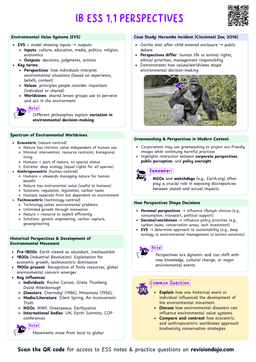Instrumental Value of Nature
Intrumental value
Instrumental value refers to the usefulness of an entity for humans. This value is based on how nature benefits humans directly or indirectly.
Unlike intrinsic value, which sees nature as valuable in itself, instrumental value is based on its practical benefits.
Types of Instrumental Value
Provisioning Services (Goods)
Nature provides physical goods that humans consume or use.
- Food (crops, fish, livestock)
- Water (freshwater sources, aquifers)
- Timber (wood for construction, paper production)
- Medicinal resources (plants used in pharmaceuticals)
Regulating Services (Ecosystem Functions)
Natural processes help regulate the environment in ways beneficial to humans.
- Decomposers (bacteria, fungi) break down waste and recycle nutrients.
- Forests absorb CO₂, helping regulate climate.
- Wetlands filter pollutants from water, improving water quality.
Cultural Services (Human Development and Inspiration)
Nature contributes to human knowledge, well-being, and creativity.
- Scientific discoveries (studying ecosystems for new medicines).
- Recreation and tourism (national parks, ecotourism).
- Artistic inspiration (landscapes in paintings, literature).
- Spiritual significance (sacred groves, pilgrimage sites).
Supporting Services (Ecosystem Maintenance)
These services underpin all other ecosystem functions.
- Soil formation (decomposition and weathering).
- Photosynthesis (provides oxygen and sustains food chains).
- Pollination (essential for crops and wild plants).
Intrinsic Value of Nature
Intrinsic value
Intrinsic value refers to the worth of something independent of its usefulness to humans.
It suggests that nature, including both living organisms and non-living elements, has value in itself, regardless of whether it benefits people.
Living Organisms
- Biodiversity: Every species has value simply by existing, whether or not it serves human purposes.
- Animal Rights: Many argue that animals deserve respect and protection because they are sentient beings.
- Ecosystem Integrity: Natural systems, such as forests and coral reefs, should be preserved even if they do not directly provide human benefits.
Non-Living Objects
- Landscapes: Mountains, rivers, and deserts may be valued for their wildness, beauty, or cultural significance.
- Cultural and Spiritual Significance: Many communities consider certain natural sites sacred, giving them deep non-material value.
Comparison: Intrinsic vs. Instrumental Value
| Intrinsic values | Instrumental values | |
|---|---|---|
| Definition | Nature has value in itself, regardless of human use. | Nature is valued for its usefulness to humans. |
| Example | Protecting a forest because it has a right to exist. | Conserving a forest because it provides timber and clean air. |
| Ethical base | Ecocentrism, Deep Ecology. | Anthropocentrism, Sustainable Development. |
Why is Intrinsic Value Important?
- Encourages ethical conservation beyond economic or practical reasons.
- Supports stronger environmental policies that protect nature for its own sake.
- Acknowledges that all species and ecosystems have a right to exist, fostering biodiversity protection.
Incorporating both intrinsic and instrumental values into environmental decision-making ensures a more holistic and ethical approach to sustainability.
Intrinsic and Instrumental Value: Complementary Concepts
- The concepts of intrinsic value and instrumental value are not mutually exclusive, they can coexist and complement each other.
- An entity can possess both types of value, depending on the context and perspective.
Whales
Intrinsic Value
- Aesthetic Appeal: Whales may be valued for their beauty, majesty, or their role in the natural world. Many cultures or individuals might appreciate whales for their sheer existence, irrespective of their utility to humans. This is an example of intrinsic value.
- Ethical Respect: From an ecocentric or biocentric viewpoint, whales are valued because they are living beings with inherent worth, deserving of respect and protection.
Instrumental Value
- Tourism: Whales can have instrumental value through whale-watching tourism. People travel to specific locations to see whales, which can generate revenue and support local economies.
- Ecological Benefits: Whales also contribute to marine ecosystems by regulating fish populations and enhancing nutrient cycling, making them valuable to human interests, such as fishing and ecosystem services.
Interplay Between the Two Values
- Aesthetic and Economic: A whale may be admired for its beauty (intrinsic value), but it also brings economic value through tourism (instrumental value).
- Ethical and Practical: Conservation efforts may be justified both by the ethical duty to protect whales (intrinsic value) and by their contribution to economic benefits through ecotourism or ecosystem stability (instrumental value).
Why the Coexistence Matters
- Holistic Conservation: Understanding that something can have both intrinsic and instrumental value helps form more well-rounded conservation strategies.
- Ethical Decision-Making: Ethical decision-making does not have to solely rely on one kind of value. A whale might be protected because of both its inherent dignity and economic importance.
Protecting whales because they are important to both the environmental health and human society.
By recognizing that entities can have multiple types of value, we can develop comprehensive environmental policies that address both moral obligations and practical benefits.


